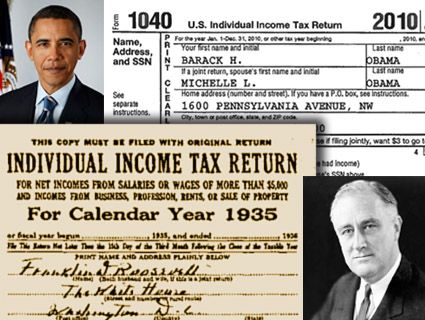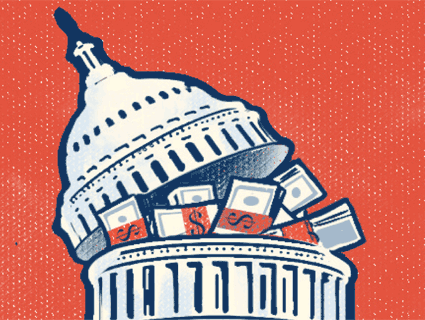
<a href="http://www.shutterstock.com/pic.mhtml?id=6516523">Orla</a>/Shutterstock
Editor’s Note: For perspective on the debate over tax cuts and deficit fixes, a classic case study of how the tax code became a slush fund for corporate America.
IN A SEASON OF campaign rallies and million-dollar ad buys, President Bush opted for one decidedly understated ceremony. On October 22, just 11 days before the election, he boarded Air Force One to sign $137 billion in new tax breaks for corporate America, one of the largest industry giveaways in two decades. This was his fifth major tax cut, but this time there was no glad-handing, no photo op—just a one-sentence press release. The president had nothing to brag about. His signature expanded exactly the sort of tax avoidance he had railed against at a campaign rally that morning: “The rich hire lawyers and accountants for a reason when it comes to taxes,” Bush had told a roaring audience at a hockey arena in Wilkes-Barre, Pennsylvania. “That’s to slip the bill, and stick you with it.”
It was an apt description of the vaingloriously named American Jobs Creation Act of 2004. Though the law began as an effort to end a $5 billion-a-year corporate tax subsidy that had been declared illegal by the World Trade Organization, it had grown into a hydra-headed beast. The law’s principal author, Ways and Means Committee chairman Bill Thomas (R-Calif.), jokingly referred to it as “Miss Piggy” on the House floor. Arizona Senator John McCain decried “the worst example of the influence of special interests that I have ever seen.” The president’s own Treasury secretary, John Snow, bemoaned the myriad “tax provisions that benefit few taxpayers.” Top White House economists protested one new loophole that would cut $3 billion, primarily from the taxes of pharmaceutical and high-tech companies, without yielding “any substantial economic benefits.”
Almost every industry in America received special favors. The tax cuts included half a billion for shipbuilders Northrop Grumman and General Dynamics, $100 million for NASCAR racetrack owners, and $9 million for arrow manufacturers. Importers of Chinese ceiling fans—like Home Depot—got a break, as did energy companies angling to build a natural gas pipeline in Alaska. About $231 million went to reduce the taxes of shopping-mall developers in the states of key House and Senate members. Four Texas companies received special dispensation to shelter their profits in the Caribbean. The law also cut taxes on railroads, coffee roasters, timber firms, and Hollywood studios. General Electric received tax benefits worth more than $1 billion over the next decade.
“From the beginning to the end, this was designed by lobbyists,” says C. Eugene Steuerle, codirector of the Urban-Brookings Tax Policy Center, who spearheaded corporate tax reform as a member of the Reagan Treasury in 1986. “The only question was whether this was the worst tax bill in our lifetime or the worst tax bill in U.S. history.”
WHEN REPUBLICAN leaders took control of the House of Representatives a decade ago, they vowed to end such legislative fiascoes. Unfettered markets rather than government intervention, they proclaimed, would determine Wall Street’s winners and losers. In the Contract With America, Republicans promised a return to “fiscal responsibility” and to “end the cycle of scandal and disgrace” by which Democrats pandered to special interests. But far from living up to this rhetoric, the GOP leadership has presided over an explosion of new tax loopholes and pork-barrel spending. “It’s worse now than it was under the Democrats,” says Stephen Moore, president of the archconservative Club for Growth. “The Democrats invented the game, and Republicans perfected it.”
Conservatives in Congress, especially, have seized upon tax policy as a way of doling out favors to supporters while maintaining a facade of “smaller government”; tax breaks boost corporate bottom lines as effectively as pork-barrel expenditures, without requiring the Treasury to cut a check. Since 2000 alone, Wall Street’s tax bills have dropped by a third. As a percentage of the gross domestic product, corporate taxes are now at their lowest level in 20 years—and their second-lowest level since the Great Depression. Nearly 95 percent of corporations pay less than 5 percent of their income in taxes. This despite a tax rate that officially stands at 35 percent.
“The corporate income tax bears no relation to income—it’s a bunch of special-interest provisions,” says Gary Hufbauer, a fellow at the Institute for International Economics and a former tax policy analyst in the Nixon, Ford, and Carter administrations. Corporate America, he says, has gotten the message: Taxation is little more than punishment for not promoting your interests on Capitol Hill. “If you do not lobby,” says Hufbauer, “you are going to get taxed.”
A WILDLY UNPOPULAR loophole secured by four companies from Houston illustrates how easily special interests were able to hijack the American Jobs Creation Act. Weatherford International, Noble Corporation, Nabors Industries, and Cooper Industries—all located in or around the home district of House Majority Leader Tom DeLay—hired a small army of lobbyists in 2002 with a simple, if audacious, aim: to protect a tax benefit that the congressional leadership, and even President Bush, had vowed to end.
The provision in question allowed U.S. firms to open Potemkin headquarters in tax havens like Bermuda to hide their profits from the Internal Revenue Service. This so-called Bermuda loophole had saved companies like Accenture and Tyco International millions. Concerns about leaving other taxpayers to take up the slack were—at least in corporate boardrooms—easily dismissed. As one consultant from Ernst and Young advised at the time, “The patriotism issue needs to take a backseat.”
But in the God-Bless-America fervor that followed 9/11, the press began spotlighting these “corporate turncoats,” whose new headquarters often amounted to little more than a post office box with a beachfront view. Public outrage followed. In March of 2002, Iowa Senator Charles Grassley, the top Republican on the Finance Committee, vowed to close the loophole and promised “serious penalties” for any company that moved offshore. “Proceed at your own peril,” he said. The Senate promptly proposed stiff fines for any company bolting to a tax haven after the date of Grassley’s declaration. Rep. Thomas, the chief Republican tax writer in the House, soon introduced his own bill backing up Grassley’s threat.
The tough talk worked. Several corporations scuttled talk of moving. Stanley Works, the tool company, even reversed its decision to relocate to Bermuda after a personal appeal from lawmakers—including DeLay. “We had Senator Grassley holding up our products and saying, ‘Here is a company that is a traitor,'” said Mike Bartone, Stanley’s vice president for taxes. “It was a factor.”
But the Houston Four openly defied the Republican leadership. Placing potential profits over patriotism—and, seemingly, over prudence—each of the companies moved its headquarters overseas between April and June of 2002. It was a risk with a huge upside: Cooper Industries—a direct competitor to Stanley Works—stood to save $55 million a year by moving to Bermuda. Oil service firms Nabors Industries and the Noble Corporation would each shave at least $9 million from their taxes. For Weatherford, a third oil service firm, a Caribbean address would slash its taxes by a reported $40 million.
Cementing these gains, of course, would mean derailing Grassley’s and Thomas’ proposals. But, in the current Congress, that was nothing a couple million dollars worth of high-powered lobbying couldn’t accomplish.
THE LAST GOLDEN AGE for corporate tax dodgers came in the mid-1980s. Businesses trafficked in paper losses to mask profits. Blue-chip corporations spent lavishly on equipment for the tax benefits of leasing it to other companies. By the end of his first term, Ronald Reagan promised to turn things around. “It would be immoral,” Reagan said during his 1984 State of the Union address, “to make those who are paying taxes compensate for those who aren’t paying their share.”
Fixing the tax code fell to the economists at the Treasury. With few exceptions, special interests were kept at bay. Congress soon passed the Tax Reform Act of 1986—Reagan’s signature domestic achievement. Although the bill lowered tax rates, it closed so many loopholes that corporations paid the IRS an additional $100 billion over the next five years. But this era of more equitable taxation was short-lived. As Treasury Department analysts later lamented, the new system only made the art of tax evasion more profitable. Two decades later the great American tax dodge was back: At least 82 companies in the Fortune 500 paid no income taxes whatsoever during at least one of the first three years of George W. Bush’s administration.
Like Reagan, President Bush has repeatedly claimed that he wants to simplify the tax code. “The more simple it is,” he declared on a campaign swing last August, “the better it is for the American people.” But Bush showed none of the Gipper’s mettle when it came to putting those words into action in the corporate tax bill.
The American Jobs Creation Act was a monster two years in the making. In January 2002, the World Trade Organization ruled that a $5 billion-a-year tax break for American exporters amounted to an illegal subsidy. Congress would have to repeal the law to avoid punishing European tariffs. But antitax crusaders on the Hill weren’t about to stick corporate America with the equivalent of $50 billion in new taxes over the next decade, so the congressional leadership sought to replace the illegal benefit with a legal one.
With the corporate tax code in need of major surgery, Bush was presented with a once-in-a-generation opportunity for comprehensive reform. But the president refused to get involved. Unlike his approach to cutting personal income, dividend, and estate taxes, he didn’t instruct the Treasury to craft a coherent policy. To avoid stepping on the toes of his corporate supporters by shuttering favored tax breaks, Bush simply let the Republican Congress have at it.
Lawmakers began with a modest reform agenda—one that included closing the Bermuda loophole and ending tax breaks to companies that let executives take personal flights on company aircraft. But reform quickly took a backseat to horse-trading. “The way you get the votes,” said one tax lobbyist who worked on the bill, “is you buy them.” The bill needed the support of hundreds of lawmakers, each with corporate constituents to please.
Corporate lobbyists began targeting members with plum committee assignments to sponsor their pet tax cuts. International Speedway Corp. spent $280,000 to retain four former congressional staffers. Senator Rick Santorum (R-Pa.), who has a Speedway track in his state, responded by adding $92 million in tax cuts for NASCAR racetrack owners. After collecting more than $45,000 in campaign contributions from Carnival Corporation, Senate Finance Committee members Lisa Murkowski (R-Alaska) and Bob Graham (D-Fla.) snuck in a $28 million tax break for cruise ship operators. Fellow committee members Olympia Snowe (R-Maine) and John Breaux (D-La.) both pushed a break for military shipbuilders with shipyards in their home states.
The bill quickly degenerated into a special-interest free-for-all. Even reform-minded senators weren’t immune: “Nearly every member raised narrow-interest provisions,” Grassley later remarked. “We all do it.”
THE HOUSTON FOUR joined early in the lobbying frenzy. They didn’t need to stop the Bermuda loophole from being closed; it was to their advantage to know that it would be shut—eventually. They simply needed to make sure the cutoff date was changed so that their tax gains would be grandfathered in. For that they needed to get the ear of the House leadership—particularly Majority Leader DeLay and Chairman Thomas.
The four had the advantage of being longtime contributors to Republican campaign chests, with Cooper Industries leading the pack with nearly $200,000 in contributions to House Republicans in the 2004 campaign cycle. To push their agenda, the firms signed up a former congressman and more than a half-dozen high-profile former Republican staffers. Noble Corporation and Weatherford International joined forces to retain Bill Archer, the retired representative from Houston who had run Ways and Means until 2001, when Thomas took over. They also bought the services of Archer’s former chief of staff, Don Carlson. Cooper and Nabors teamed up to hire an all-star cast that included the former director of the Joint Committee on Taxation, as well as both a former chief of staff and a special counsel to that tax committee. In all, the four companies spent more than $2 million on lobbyists for the single issue.
They got what they paid for. In March 2003, DeLay himself intervened on their behalf. At the time, the House was considering an unrelated bill freighted down with tax proposals—including a measure to close the Bermuda loophole—that would eventually find their way into the American Jobs Creation Act. At 8:30 p.m. on March 5—the night before the House was scheduled to vote on this bill—GOP leaders called an “emergency meeting” of the Rules Committee. There, according to the Houston Chronicle, DeLay introduced a new proposal that would postpone closing the Bermuda loophole by exactly one year.
While Republican infighting doomed the bill—it never came up for a vote—DeLay’s backroom maneuver permanently altered the House debate over the Bermuda loophole. When the final versions of the American Jobs Creation Act passed in the House and Senate, the Senate stuck to Grassley’s original Bermuda deadline. The House favored DeLay’s—which, in turn, favored the Houston Four.
The task of reconciling the two bills fell to Chairman Thomas. Although he had previously stood shoulder to shoulder with Grassley, he did not cross DeLay. The later cutoff date prevailed.
All that was left was grandstanding. Grassley made one final protest. “There were many companies,” he complained, “that defied our warnings.” He then addressed Thomas directly: “The problem I have with your [bill], Mr. Chairman, is that these companies get off scot-free.”
Rep. Sandy Levin, a Democrat from Michigan, asked a congressional accountant to read the names of all the companies that would benefit from delaying the loophole closure by one year. There were exactly four: Noble. Weatherford. Cooper. Nabors.
Three weeks later, somewhere in the airspace over Ohio, the tax break for the Houston Four—along with hundreds of other corporate considerations crafted by lawyers and tax accountants—became law when President Bush signed the $137 billion bill. Or, more accurately, when he stuck you with it.

















